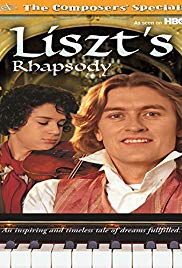LISZT’S RHAPSODY
SUBJECTS — Biography; Music/Classical;
SOCIAL-EMOTIONAL LEARNING — Talent;
MORAL-ETHICAL EMPHASIS — Respect.
AGE: 6-12; No MPAA Rating;
Drama; 1986; 49 minutes; Color. Available from Amazon.com.
There is NO AI content on this website. All content on TeachWithMovies.org has been written by human beings.

SUBJECTS — Biography; Music/Classical;
SOCIAL-EMOTIONAL LEARNING — Talent;
MORAL-ETHICAL EMPHASIS — Respect.
AGE: 6-12; No MPAA Rating;
Drama; 1986; 49 minutes; Color. Available from Amazon.com.
TWM offers the following worksheets to keep students’ minds on the movie and direct them to the lessons that can be learned from the film.
Film Study Worksheet for a Work of Historical Fiction and
Worksheet for Cinematic and Theatrical Elements and Their Effects.
Teachers can modify the movie worksheets to fit the needs of each class. See also TWM’s Historical Fiction in Film Cross-Curricular Homework Project.
This is a fantasy about Franz Liszt, the great pianist, and composer. The film shows Lizst after he has achieved success as a performer. At this point in his career, he finds no satisfaction in just playing what others have written and he is looking for a source of inspiration for his own work. One day, on the streets of Paris, Liszt sees a talented gypsy boy playing the violin. He takes the child under his wing and attempts to train him to perform classical music. In the process, Liszt finds the inspiration that had eluded him for so long.
Selected Awards:
This film is a part of the Composers’ Specials recipient of the 1996 CableACE Award for Best Children’s Series and the Gemini Award(Canada’s Emmy) for Best Youth Program or Series. The series also received the American Library Association’s Recommendation to all public schools and libraries in 1996.
Featured Actors:
Geordie Johnson, Drew Jurecka, Peter Keleghan, Ida Carenvali, Fab Filippo.
Director:
Richard Mozer.
This film will introduce children to Franz Liszt and the European prejudice against gypsies.
None.
Around the time that your child watches this movie, play some of Liszt’s music and tell your child what it is. Ask and answer the Quick Discussion Question. If your child is very interested in the film, go through some of the other Discussion Questions.
Franz Liszt (1811 – 1886) was a renowned pianist, composer, teacher and conductor who actively pursued his career from the age of nine until his death at the age of 75. Liszt was a brilliant performer who was regarded, in his prime, as the world’s greatest pianist. Liszt created the concert form of the piano recital in 1839. Until that time even the best pianists performed only with singers or orchestras and with the piano facing the audience. Liszt turned the piano to the side so that the audience could see him and made the pianist the center of the performance.
Liszt also composed many pieces of classical music creating new musical forms such as the symphonic poem. Liszt was a teacher of great renown whose students worshipped him. When he took up the baton to conduct, he pioneered the modern style of conducting which sought to govern the flow of the music, rather than simply keeping time. Liszt was a mentor to many great musicians including Chopin, Grieg and Wagner. He pioneered the use of charity concerts to aid worthy causes.
1. See Discussion Questions for Use With any Film that is a Work of Fiction.
2. What does the name of this film “Liszt’s Rhapsody” tell us about the film?
1. Did Liszt do the right thing in trying to take a child from his life as a gypsy and make him into a classical violinist?
Discussion Questions Relating to Ethical Issues will facilitate the use of this film to teach ethical principles and critical viewing. Additional questions are set out below.
(Treat others with respect; follow the Golden Rule; Be tolerant of differences; Use good manners, not bad language; Be considerate of the feelings of others; Don’t threaten, hit or hurt anyone; Deal peacefully with anger, insults, and disagreements)
1. Why did most of the people that Liszt knew hate gypsies?
2. Do you remember any other stories in which a man bets that he can take someone from the streets and train them? What are the similarities and differences between the two stories?
This Learning Guide was last updated on December 10, 2009.